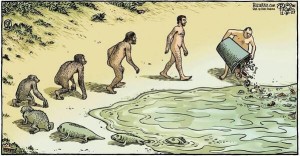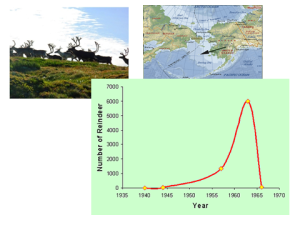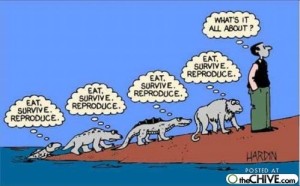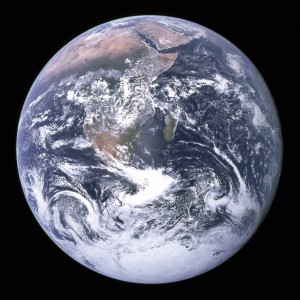Save biodiversity for humanity.
(For the sake of argument)
By Erlend Bersaas.
Increasing temperatures, changes in precipitation patterns, loss of ice, rising sea levels, loss of biodiversity, “the sixth extinction”, freshwater shortage, ocean acidification. All apparently due to one single species astonishing evolutionary success. Homo sapiens sapiens. Humans.
The impact our species have had is so vast that we are in the process of defining our own epoch. The Anthropocene (Vaughan, 2016). The ongoing debate on when the Anthropocene started is not that interesting. The point is that it already has started, and we need to slow down the destruction of our habitat. If not, we are dangerously close to reaching our species carrying capacity. Just feeding an ever-increasing population will eventually become difficult should there not come a second “green revolution” (Godfray et al. 2010). We do not want to end up like the reindeers of St. Matthews Island, an island in the Bering Sea, where 29 animals were introduced in 1944, increased to over 6000, with the result of total collapse by 1966 (Klein 1968).
Hardly any place on the planet is unaffected by humans (Millennium Ecosystem Assessment 2005). Some honourable mentions could be the lakes, which we have not yet disturbed; beneath the cryosphere, but the rest of the planet have experienced some form of human fingerprint. Most of the implications of our behaviour is negative for other species although there are of course exceptions, such as rats and maize, or sheep for that matter, but in general, I do not think too many will disagree with the idea of humans as a negative force on the wildlife and ecosystems. As the Millennium Ecosystem Assessment (2005) states:
Human actions are fundamentally, and to a significant extent irreversibly, changing the diversity of life on Earth, and most of these changes represent a loss of biodiversity. Changes in important components of biological diversity were more rapid in the past 50 years than at any time in human history. Projections and scenarios indicate that these rates will continue, or accelerate, in the future. (Millennium Ecosystem Assessment, 2005, p. 2)
However, why is this a bad thing? Sure, we have transformed a lot of the planet, but in doing so we have become greatly successful. And basically that is what it`s all about.
We are after all competing with every other organism on this planet. The problems arise when we have exhausted our recourses and begin to suffer for it. Thinking that nature is some pristine place, an Eden, where animals and plants live in some sort of stabile harmony, is not going to get us anywhere. We are here, and we are a part of nature as is every other organism. We just dominate everything. We have even made up stories to alleviate us from any moral dilemma concerning other species. The only implications we have had to consider was the one that affected us directly. Just think of what The Bible is saying on the matter of human supremacy on nature:
And God blessed Noah and his sons and said to them, «Be fruitful and multiply, and fill the earth. The fear of you and the terror of you will be on every beast of the earth and on every bird of the sky; with everything that creeps on the ground, and all the fish of the sea, into your hand they are given. Every moving thing that is alive shall be food for you; I give all to you, as I gave the green plant.”
Genesis 9. 1-3 (God, no date.)
The meme of humans as something outside of nature seems to have been greatly successful and have probably participated in our species great evolutionary success. However, because we no longer had to take considerations to what we did with nature, more or less every other organism suffered*.We can argue that this is morally wrong, and that everything has an intrinsic value. It does however look like self-preservation is the underlying argument when trying to convince anyone to save biodiversity and ecosystems.
The UN gives us the argument that we have to save biodiversity because “Biodiversity produces six major services for us: It gives us clean water, food, building materials and medicines. It protects us against extreme weather and help prevent climate change” (Globalis 2016 (my translation)). We can also add different pleasures as recreation, beauty and knowing that some organisms exist, but we should be honest about it. We want to protect life in all its forms due to its value for us. If we do not think anthropocentrically we know what we have to do to stop our domination and destruction of other species, but I for one will not participate in culling half the world’s population.
The Earth is the only world known so far to harbor life. There is nowhere else, at least in the near future, to which our species could migrate. Visit, yes. Settle, not yet. Like it or not, for the moment the Earth is where we make our stand. (Sagan 1994)
*Without going into whether every organism can suffer, because that will only lead to some sort of philosophical argument of where different organisms should be placed on a gradient for the separation of humans from the rest.
Figures:
1: Piraro, D (2007) [Internet] available at: http://bizarro.com/page/2/?s=evolution&submit=Search . Accessed [26.02.2016]
2: Klein, D., Walsh, J. and Shulski, M. (2009) What Killed the Reindeer of Saint Matthew Island? [Internet] available at: http://www.weatherwise.org/Archives/Back Issues/2009/Nov-Dec 2009/full-Reindeer.html. Graph from: [ Internet]http://qualicuminstitute.ca/tenets/317-2/ . Accessed [25.02.2016]
3: Hardin (No Date) [Internet] available at: http://thechive.com/2009/02/26/every-single-evolution-cartoon-we-could-get-our-hands-on-36-photos/ . Accessed [26.02.2016]
4: NASA (2015) Blue Marble – Image of the Earth from Apollo 17. [Internet] http://www.nasa.gov/content/blue-marble-image-of-the-earth-from-apollo-17 . Accessed [26.02.2016]
Sources:
Globalis (2016) Hvorfor er naturmangfold viktig? [Internet] http://www.globalis.no/Tema/Naturmangfold/2.-Hvorfor-er-naturmangfold-viktig .Accessed [25.02.2016]
God (No Date) The Bible. Nicaea.
Godfray H.C.J., J. R. Beddington, I.R. Crute, L. Haddad, D. Lawrence, J.F. Muir, J. Pretty, S.
Robinson, S. M. Thomas, C. Toulmin (2010) “Food: Security: The Challenge of
Feeding 9 Billion People”. Science. 327: 812-818
Klein, D. R. (1968) The introduction, increase, and crash of reindeer on St. Matthew Island.
- Wildl. Manage. 32: 351-367.
Millennium Ecosystem Assessment, 2005. Ecosystems and Human Well-being: Biodiversity Synthesis. World Resources Institute, Washington, DC.
Sagan, C. (1994) Pale blue dot. Also available on YouTube at https://www.youtube.com/watch?v=4PN5JJDh78I
Vaughan, A (2016) Human impact has pushed Earth into the Anthropocene, scientists say. The Guardian. [Internet] http://www.theguardian.com/environment/2016/jan/07/human-impact-has-pushed-earth-into-the-anthropocene-scientists-say . Accessed [25.02.2016]




You have succeeded in provocing me (which is a good sign for a blog post). I understand where you are coming from, but I do not agree with you. You have been talking a lot about that it is all about the humans throughout the class, and it made me a little mad.
Yes it is true that if we make the world go under, with the effect that 95 % of the species go extinct, including us – the world will still be able to recover from it. But the fact that it is one single species (us) that is the cause of that terrifies me. The other mass extinctions have been because of uncontrollable abiotic factors like volcanous, meteors, ice ages etc. But to grow so far beyond your caring capacity that you destroy almost all life on earth is a pretty stupid thing to do! Especially when we know better. (And I guess you are going to argue that these are my feelings, and therefor it is a humancentered argument after all, but I guess we will just have to agree to disagree).
Also, every species does have a value – even if it doesn’t have a value for humans. It is a part of an ecosystem and some other part of that ecosystem is relying on that species to survive or to thrive.
I think we should conserve biodiversity and nature in it self just because! But I do understand that we need to appeale to human-related arguments to get the politicians to do something about it. But if it were up to me – I would conserve everything, even a catterpillar, fungi or bird that I don’t benefit from.
Hi! Thanks for replying.
Just a couple of things. That you are a little mad is a good thing. We all should be. Because as James Hanse on writes in his book Storms of my grandchildren: “The picture has become clear. Our planet, with its remarkable array of life, is in imminent danger of crashing.” (Hansen 2009 p. 277)
This is what`s that at stake.
The also have been an extinction due to species changing the atmosphere prior to our go at it. Cyanobacteria, or blue-green algae, gave oxygen to the atmosphere 2.3 billion years ago and that killed of all life that oxygen was toxic to. Of course in a different timescale and less complex life forms, but it is argued that the oxygenation led to a snowball earth (Kopp et al.2005). However, that is a bit beside the point. The argument that that every species have value because it is part of an ecosystem is sort of the same argument that the UN uses when stating that the resilience or adaptation to climate change is better the higher the biodiversity is. That is what give value to humans. Because humans do rely on ecosystems to survive and thrive. Unless we find an energy source abundant enough, and clean enough, to create anything in closed containers. And in saving nature just because where drew the line? Arne Næss claims that mountains have intrinsic value, but trying to stop them eroding or grow would be futile. Conserve just to conserve is surly a noble thought, but how do we separate the human caused extinctions from the «natural» ones? (Knowing that som cases of course is very easy to separate). The point is that we, the humans, have to do something to save ourselves, from ourselves. If we do not, a lot of other organisms is going down with us.
Kopp et al. (2005)The Paleoproterozoic snowball Earth: A climate disaster triggered by the evolution of oxygenic photosynthesis. http://www.pnas.org/content/102/32/11131.full.pdf
Thanks for a thought-provoking post, Erlend! We do have to save ourselves, from ourselves. Our small little pale blue dot (Sagan and Feynman are two of my biggest heroes).
With that said, I think we seriously need to rethink the arguments we use to «sell» the importance of biodiversity with. I like to think of it as hooks with different types of bait (e.g. economists need a $$$ incentive). The moral argument, which can be extremely powerful, will not persuade everyone.
I like the way one of my lecturers put it: «Conservation problems are people problems, and people problems require people solutions.»
HI.
The image of different hooks is not a bad one. The problem with the moral argument is that it can be deconstructed using the same argument as the ones advocating it. That we persuade the most amount of people is the important thing. Not necessarily how. Although we can always argue if the goal justifies the means. I also like the frase “Conservation problems are people problems, and people problems require people solutions.” Spot on.